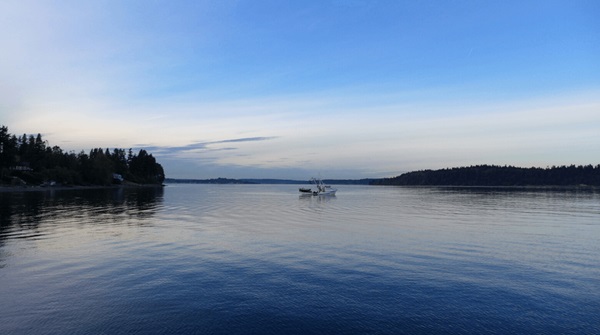After these things Jesus showed himself again to the disciples by the Sea of Tiberias; and he showed himself in this way. Gathered there together were Simon Peter, Thomas called the Twin, Nathanael of Cana in Galilee, the sons of Zebedee, and two others of his disciples. Simon Peter said to them, ‘I am going fishing.’ They said to him, ‘We will go with you.’ They went out and got into the boat, but that night they caught nothing.
Just after daybreak, Jesus stood on the beach; but the disciples did not know that it was Jesus. Jesus said to them, ‘Children, you have no fish, have you?’ They answered him, ‘No.’ He said to them, ‘Cast the net to the right side of the boat, and you will find some.’ So they cast it, and now they were not able to haul it in because there were so many fish.
When they had gone ashore, they saw a charcoal fire there, with fish on it, and bread. Jesus said to them, ‘Bring some of the fish that you have just caught.’ So Simon Peter went aboard and hauled the net ashore, full of large fish, a hundred and fifty-three of them; and though there were so many, the net was not torn. Jesus said to them, ‘Come and have breakfast.’ Now none of the disciples dared to ask him, ‘Who are you?’ because they knew it was the Lord. Jesus came and took the bread and gave it to them, and did the same with the fish.
— John 21:1-6; 9-13
Once again, we have a story of the disciples not recognizing Jesus. Jesus stands on the shore and asks about how their business is going—startlingly casual, as though he had no idea that they wasted a whole night with nothing to show for their work. Jesus tells them to “cast their net to the right side of the boat.” Since this is net fishing, changing the location of the nets by a few feet at most wouldn’t likely make any difference at all in the catch. My dad is a shellfish harvester and fisherman; he lives near Seattle, and his office is the Puget Sound. I’ve seen this firsthand in watching him cast his nets off the boat. Any good net fisher knows that you need to get a little distance if you’re not catching fish in a certain spot. This was a call to try something with little chance of success. It would have seemed like a risk, and probably not a useful one. Jesus had a lot of nerve!
But it was a bigger risk than simply not catching fish. Fishing nets would normally have been cast to the left side of the boat so they could be hauled in more easily led by the “culturally” stronger arm—the right arm. Casting to the right meant if they caught anything, they would have to work counter to their cultural—and even physical—norms to haul the catch in. When the disciples learned to rely not on their experience but on the resurrected Jesus, their catch of 153 large fish meant their call, and their catch, was inclusive. 153 was actually the number of nations believed to exist at the time. Even in this story about fishing, we hear the message that everyone is included in the Kingdom of God.
They stumble onto the shore with their catch, and as they are enjoying the breakfast that Jesus made, they all recognize Jesus. It’s not too much of a stretch to say that when Jesus cooked them breakfast, they were celebrating Communion. Not much later, in early Syrian Christianity, Holy Communion was celebrated with bread and fish rather than bread and wine. Jesus poured out his Spirit on the disciples, and now what he wanted to do most is cook breakfast for them. And he is able to do this because they listened to his seemingly nonsense suggestion to fish on the “other side.”
I like to imagine that the disciples may have secretly balked at the idea of putting their net down on a side that went against their culture—it’s a very human response, isn’t it? They may have grumbled the whole time, or maybe they trusted Jesus fully. But we can learn from this story that when there's a visibility issue—when there is something we're not seeing, or when we can't recognize God—God still sees us. Jesus is with us, kneeling down to teach us what it means to serve, and we experience the grace and strength we need to go back out to the other side.

